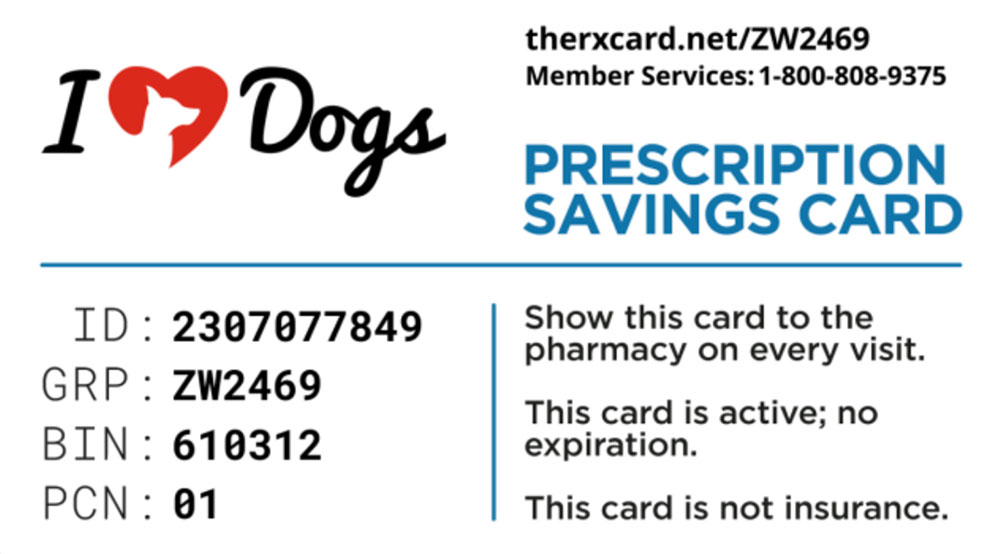Are you looking for a way to save your dog’s Budesonide prescription? Our Rx Discount Card for Pets can save you up to 80% of your pet’s Budesonide.
What Pharmacies Accept This Budesonide Coupon Card for Pets?
This card is accepted at over 60,000 participating pharmacies in the US, including:
How Much Will My Pet’s Budesonide Cost Using This Coupon?
In order to view a real-time pricing estimate, please use our pricing lookup tool here.
How Do Prescription Discount Cards for Pets Work? How Can It Help Me Save On My Dog’s Budesonide Prescription?
Prescription discount cards for pets work much like the ones for humans. They provide discounted prices for medications that may not be covered by insurance or for individuals (or pets) who don’t have insurance. Here is a brief description of how these cards work:
- Acquire a Card: First, you need to get a pet prescription discount card. Some pet pharmacies, pet supply stores, and even some veterinarian offices offer these cards. There are also numerous online services that provide these cards for free or at a small fee. Ensure that the card is accepted at your pharmacy before getting it.
- Present the Card at the Pharmacy: When you get your pet’s prescription filled, you simply present the discount card at the pharmacy. They will use the details on the card to apply the relevant discounts to your purchase. It’s important to note that not all medications will be covered or have discounts. The amount of discount also varies depending on the medication and the card’s policies.
- Pay the Discounted Price: After the discount is applied, you pay the lower price for your pet’s medication. This can be significantly lower than the standard price, particularly for expensive medications or long-term prescriptions.
In the case of your dog’s Budesonide prescription, a pet prescription discount card can help you save money if Budesonide is included in the list of discounted drugs. The amount you save will depend on the specific discount offered by the card for this medication.
Before deciding on using a pet prescription discount card, here are a few things to consider:
- Compare Prices: Different cards offer different discounts, and prices can also vary between pharmacies. It’s a good idea to compare prices and discounts to find the best deal.
- Understand the Terms: Some discount cards may have membership fees or other requirements. Make sure you understand all the terms and conditions before using a card.
- Consider Insurance: If your pet has pet insurance, check whether it’s cheaper to use your insurance or the discount card. Sometimes one might be cheaper than the other.
Remember, discount cards are not insurance and they cannot be combined with your pet insurance. They simply provide a discount on the cash price of medications.
What Are Some Common Reasons Budesonide is Prescribed for Dogs?

Budesonide is a corticosteroid that reduces inflammation. In dogs, it’s commonly used to manage diseases that cause inflammation in the gastrointestinal tract. Here are some common reasons Budesonide is prescribed for dogs:
- Inflammatory Bowel Disease (IBD): This is a condition where the dog’s gastrointestinal tract becomes chronically inflamed. Symptoms can include vomiting, diarrhea, weight loss, and decreased appetite. Budesonide is often used because it primarily affects the intestines with fewer systemic side effects compared to other corticosteroids.
- Granulomatous Colitis: Also known as Histiocytic Ulcerative Colitis, this is a rare condition that causes inflammation and ulcers in the colon. Budesonide can help manage inflammation and improve the dog’s symptoms.
- Protein-Losing Enteropathy (PLE): PLE is a condition where proteins that should be circulating in the blood are lost into the intestine instead. This can lead to a variety of symptoms, including diarrhea, weight loss, and fluid accumulation in the abdomen or limbs. Budesonide can help manage the underlying inflammation causing this condition.
- Other Gastrointestinal Conditions: Budesonide may also be used to manage other conditions that cause inflammation in the gastrointestinal tract, depending on the specific situation and the vet’s discretion.
Always remember that Budesonide should only be given under the guidance of a veterinarian. It has the potential for side effects, particularly with long-term use, and needs to be carefully managed to ensure it’s providing more benefits than risks to the patient. Your vet will weigh these factors before prescribing this medication.
What Are Some Other Ways I Can Save Money on My Pet’s Budesonide Prescription?
Saving money on your pet’s prescription for Budesonide, or any other medication, can sometimes feel like a challenge. However, there are a number of ways you can potentially reduce costs:
- Buy in Bulk: If your pet will be on Budesonide for a long period of time, ask your vet about the possibility of getting a larger quantity at once. Sometimes, buying in bulk can save money.
- Comparison Shop: Prices can vary between different pharmacies. It’s worth checking a few different places, including online pharmacies, to see where you can get the best price.
- Generic Drugs: Ask your vet if a cheaper generic equivalent to the branded drug is available and safe for your pet.
- Manufacturer’s Discounts or Rebates: Some drug manufacturers offer discounts or rebates directly to consumers. Check the manufacturer’s website to see if they have any programs or coupons that could help reduce the cost of the medication.
- Ask for a Different Medication: If the cost of Budesonide is too high, ask your vet if there’s a different, less expensive medication that would also be effective for your pet’s condition.
- Pet Health Insurance: If your pet needs long-term medication or has a chronic condition, investing in pet health insurance could be beneficial. However, this would typically be a decision made before the condition arises, as most insurance plans do not cover pre-existing conditions.
Remember, while it’s important to consider costs, it’s also crucial to ensure your pet gets the necessary care for their condition. Always discuss any changes to your pet’s medication or treatment plan with your vet before making a decision.


 Toledo, United States.
Toledo, United States.